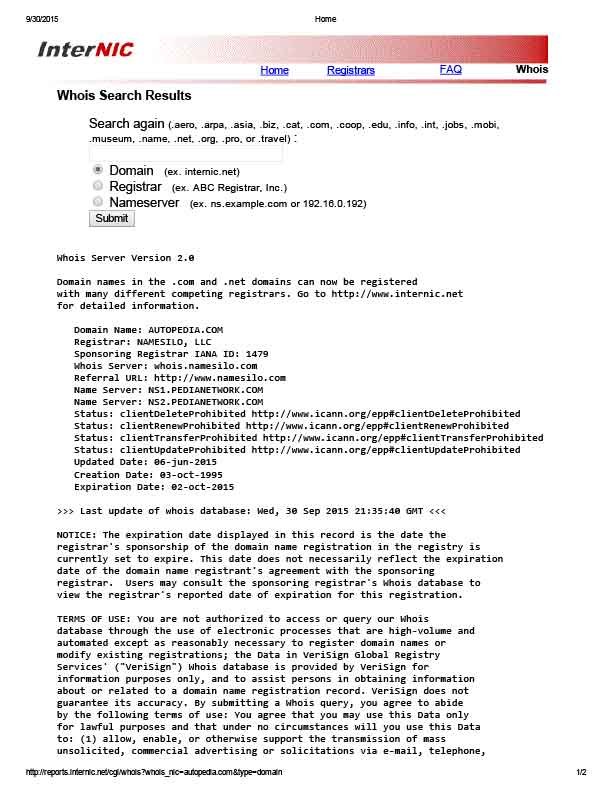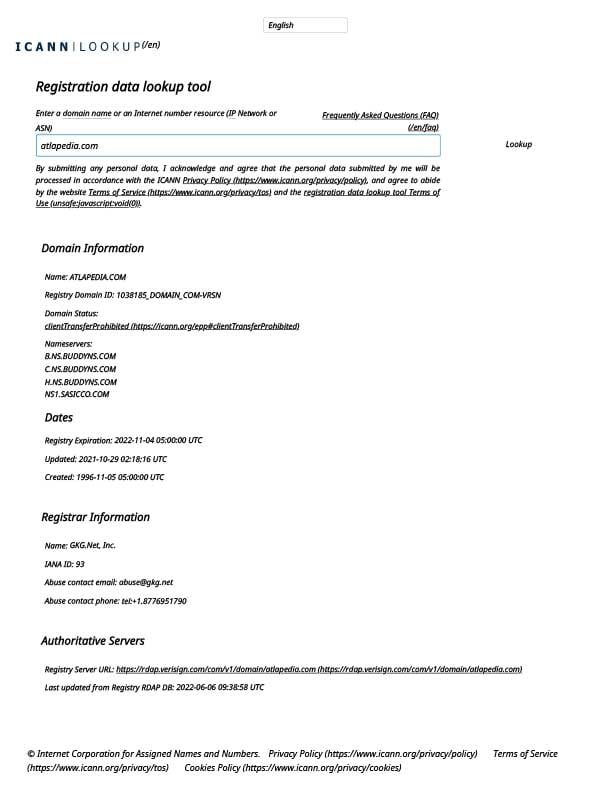“An encyclopedia (American English) or encyclopædia (British English) is a reference work or compendium providing
summaries of knowledge either general or special to a particular field or discipline.” Wikipedia
The domain “autopedia.com” was registered on October 3, 1995.
AutoPedia® — the Automotive Encyclopedia went online in November, 1995 and the earliest independent third-party documentation of AutoPedia® online by Archive.org’s “Wayback Machine” — is October 29, 1996. However, when you click on the October 29, 1996 Archive.org link for the site and then click on the “Honored Guest Registry” or the “Tire BBS” links in the archived document, there are additional archived entries from users dating from June 12, 1996 and June 20, 1996 respectively. (Note: The Archive.org’s “Wayback Machine” started crawling the web on October, 29 1996.)
The Wikipedia discussion of online encyclopedias is limited to “free wiki-type academic encyclopedias created by users” and mentions various projects including these:
“The concept of a new free encyclopedia began with the Interpedia proposal on Usenet in 1993, which outlined an Internet-based online encyclopedia to which anyone could submit content and that would be freely accessible. Early projects in this vein included Everything2 and Open Site. In 1999, Richard Stallman proposed the GNUPedia, an online encyclopedia which, similar to the GNU operating system, would be a “generic” resource. The concept was very similar to Interpedia, but more in line with Stallman’s GNU philosophy.”
AutoPedia® on the other hand, was designed as a “consumer encyclopedia” providing consumers with faster, easier access to information on the products and services they want to buy. Although AutoPedia® has always accepted “user generated content and information,” it has always been intended as a “consumer encyclopedia” that assists Internet users who are seeking the information they need in order to conduct a transaction.
The following shows the earliest “encyclopedia” domain registration dates (listed first) and earliest listings in Archive.org’s Wayback Machine (listed second in parenthesis) Domain registration dates that are not linked are domains that expired and were renewed at a later date:
EXPEDIA.COM — November 25, 1995 (11/21/96)*
ENCYBERPEDIA.COM - June 25, 1996 (10/24/1997)
WINE-ENCYCLOPEDIA.COM — September 4, 1996 (Site was never online through 2011)
GEOPEDIA.COM - October 9, 1996 (12/26/1996)
INFOPEDIA.com - October 25, 1996 (12/22/1996)
ATLAPEDIA.COM - November 5, 1996 (7/14/1997)
ELEKTRAPEDIA.COM — December 12, 1996 (2/29/2000)
INVESTOPEDIA.COM - July 25, 1999 (2/29/2000)
WORLDBOOKONLINE.COM - April, 15, 1999 (11/11/1999)
NUPEDIA.com - October 29, 1999 (3/4/2000)
OPENSITE.ORG - January 28, 2000 (3/1/2003)
GNUPEDIA.com - February 10, 2000 (07/21/2001)
WIKIPEDIA.com - January 13, 2001 (3/31/2001)
WORLDBOOK.COM - April 20, 1995 (12/23/1996) - The site was created to sell the CD-ROM version of World Book Encyclopedia. The World Book online version was available at WorldBookOnline.com starting November 11, 1999.
BRITANNICA.COM — June 14, 1995 (5/23/1998) — This site was not an online version of Encyclopedia Britannica. It was a site dedicated to selling subscriptions to the Encyclopedia Britannica starting in 1998.
Although there are unsubstantiated claims of “discussing,” “coining,” and “planning” various PEDIA suffix sites as early as 1990, the independent third-party records of the dates of domain registration and the date of an actual working website being online and indexed by Archive.org’s Wayback Machine are as documented above.
Even the most conservative AutoPedia® online date from Archive.org’s Wayback Machine taken from the Guest Registry or Tire BBS, is BEFORE the domain registration date of any other online encyclopedia site.
*Although “Expedia” was NOT an encyclopedia, it was a combination of the word “exploration” and “speed” (according to the founder, Rich Barton). However, in the early stages of the company, most consumers had no idea what the name actually stood for. And consumers would have been heavily influenced by the combination of the “representativeness heuristic” and the “confirmation bias” when they first encountered the name “Expedia” as a comprehensive travel site.





